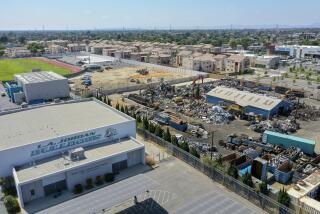Prosecutors Say Pair Responsible for Fatal Blast
- Share via
A federal prosecutor asked a jury Tuesday to hold two former Rocketdyne employees responsible for illegally burning hazardous waste that resulted in a deadly 1994 blast at the Santa Susana Field Laboratory near Chatsworth.
Assistant U.S. Atty. William Carter argued that both men knew excess chemical materials were being burned for disposal, an essential element in the prosecution of federal environmental laws.
“They are responsible for their conduct,” Carter told jurors in his four-hour closing argument.
Joseph E. Flanagan, 61, of Stanwood, Wash., and Edgar R. Wilson, 65, of Chatsworth are on trial in Riverside. The pair are accused of illegally burning chemical waste at the field laboratory on July 21 and July 26, 1994. Both testified they were conducting what they believed were legitimate experiments.
The men face up to five years in prison and a $250,000 fine on each felony count.
Defense attorneys John D. Vandevelde and Leonard Sharenow are expected to give their closing arguments in the four-month trial today.
The trial is being held in Riverside because the case, filed in Los Angeles, was randomly assigned to Judge Robert J. Timlin of the U.S. District Court’s Central District.
The July 26, 1994, explosion instantly killed chemical engineer Otto K. Heiney, 53, of Canoga Park, and physicist Larry A. Pugh, 51, of Thousand Oaks.
The case arises from the deaths of the two scientists, and alleged violations of the Federal Resource Conservation and Recovery Act.
The blast occurred as Heiney, Pugh, Wilson, James F. Weber, the group’s hazardous waste coordinator, and mechanic Lee Wells were burning materials in what the defense contends were legitimate scientific tests.
The men covered large metal trays in sawdust, then poured excess chemical mixtures on top and ignited it.
On July 21, 1994, the procedure resulted in a brush fire.
Five days later, after the first two burns were completed, the chemicals unexpectedly ignited, causing the deadly explosion.
“No one in this case testified that they had ever seen anything like this” except at an older burn pit, Carter said Tuesday.
The prosecutor argued that the procedures were unlike any other tests conducted at the lab, now owned by Chicago-based Boeing Co. Carter said the procedure was identical to that used to legally dispose of chemical waste at the company’s burn pit before its permit expired.
None of the men measured the chemicals, took notes or collected data, Carter said. “These were essentially barbecues.”
Flanagan, then the director of Rocketdyne’s Chemical Technology Group, was not present at the lab but supervised the group.
He and Wilson have defended their actions, saying they believed Heiney and Pugh were conducting legitimate scientific experiments.
Last month, Flanagan testified he did not direct or approve any “phony testing” or illegal storage of hazardous materials.
Flanagan said he authorized Heiney to conduct the tests.
After the explosion, Flanagan told internal investigators that a side benefit of Heiney’s testing was the spending of unnecessary chemicals, Carter said.
Wilson, a lab technician, told jurors earlier this month the tests appeared “unusual” to him.
Wilson said he had asked Weber, who was his supervisor, about them and was told Heiney was in charge.
Weber, 51, of Moorpark was indicted in 1999 with Flanagan and Wilson but pleaded guilty in August to a misdemeanor count of illegally storing explosive materials. Weber was expected to testify for the prosecution but did not do so.
“I think there is an avalanche of evidence ... [that] this was not a test,” Carter said. “It was an effort to get rid of these materials.”
Carter urged jurors to consider prior acts by Flanagan and Wilson.
Flanagan and his group were under considerable corporate pressure to clean up their area by getting rid of excess materials, Carter said.
Some of the materials, he said, could not be legally stored, shipped or burned without a permit.
More to Read
Sign up for Essential California
The most important California stories and recommendations in your inbox every morning.
You may occasionally receive promotional content from the Los Angeles Times.










